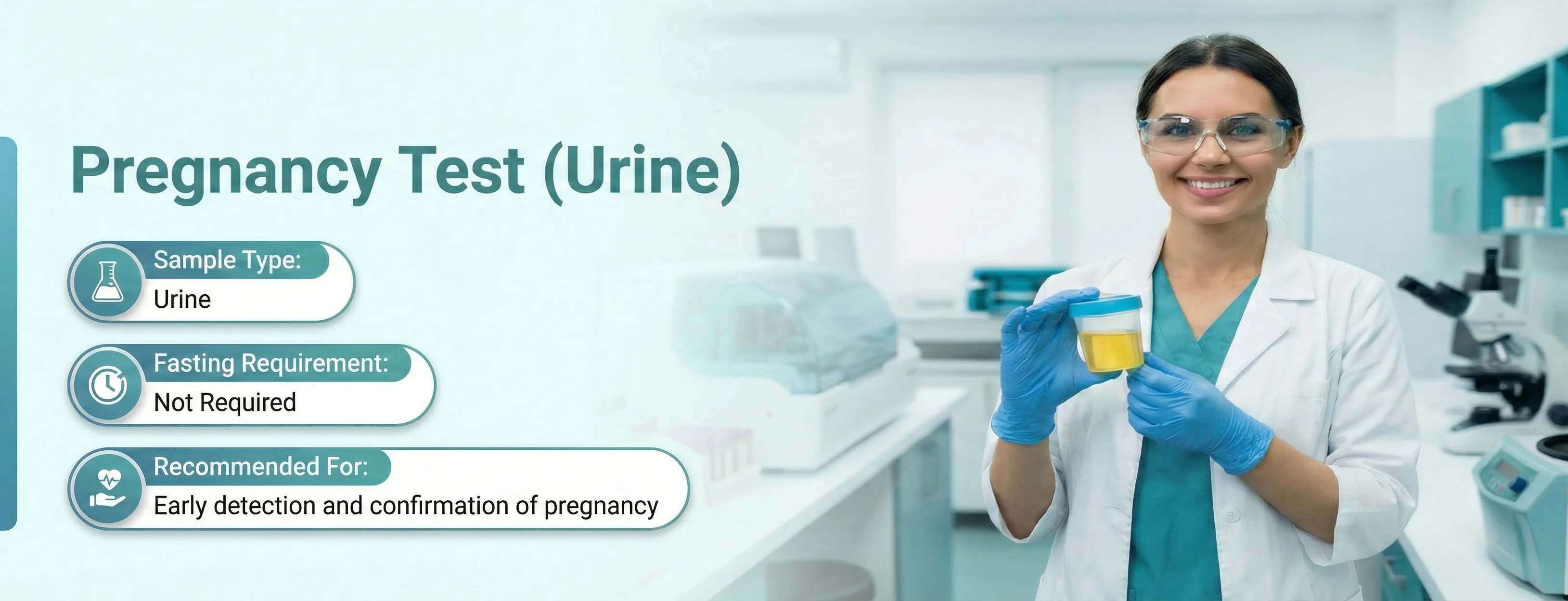65+ orders placed in your location
100% NABL & ISO Certified Lab • 100% Accurate Reports
Pregnancy Test (Urine)
HCG Test, Human Chorionic Gonadotropin Test, Urine HCG Test, UPT(urine pregnancy Test)
- SummaryThe Urine Pregnancy Test detects the presence of human chorionic gonadotropin (hCG), a hormone produced during pregnancy. It is commonly used for the early detection of pregnancy and can be done at home or in a clinic. The test uses a urine sample, and fasting is not required.Read more
- Reports Within13 HrsView Sample Report100% NABL & ISO Certified Labs
- SampleUrine
- AgePregnant women
- GenderFemales
- FastingNot Required
PharmEasy Promises
Know More About The Test
A quick info on Pregnancy Test (Urine)
Overview
A pregnancy test is taken to determine whether a female is pregnant or not. This is done by assessing whether or not Human Chorionic Gonadotropin (HCG), a hormone, is present in the woman’s urine. Human Chorionic Gonadotropin is produced by the placenta, which is the organ that develops in the uterus during pregnancy. It appears shortly after the implantation has occurred, that is, the embryo attached to the uterus’ wall.
HCG is detectable in the blood about 1 week of conception
The pregnancy test is prescribed: To determine whether she is pregnant, To diagnose abnormal conditions that may cause HCG levels to go up.
Less often, the pregnancy test can be used for the following purposes: To identify or rule out an ectopic pregnancy, a condition when a fertilised egg attaches or implants in an abnormal area of the female reproductive system and causes problems, To check for pregnancy before surgery or any other medical treatments, As a part of prenatal screening to check for Down’s Syndrome (a genetic condition), To monitor a pregnancy that may have high chances of a miscarriage, To help diagnose and look for pregnancy-related tumours.
Risk Assessment
Pregnancy, Miscarriage, Ectopic pregnancy, Germ cell tumour
What does this Test Detect?
A pregnancy test detects the presence of the HCG (Human Chorionic Gonadotropin) hormone in the urine. This hormone is produced by a woman’s placenta after fertilisation.
Urine pregnancy tests can be performed at home, though they can also be performed at the doctor’s office/ pathology lab. This test can help detect pregnancy after a week of missed periods.
Indications for Pregnancy Test (Urine) Test
This test is prescribed for a sexually active female who is suspected to be pregnant and has symptoms like
- Missed Periods
- Nausea and vomiting (this is generally referred to as morning sickness).
- Swollen and tender breasts.
- A feeling of bloating in the abdomen.
- A need to urinate frequently.
A urine pregnancy test is also taken by women who are trying to get pregnant or in cases where the birth-control methods have failed. This test is also used to rule out pregnancy before undergoing surgery or other medical procedures.
How Frequently should you take this Test?
This test should be taken if there is reason to suspect you are pregnant. This is usually when a woman has missed her period after having had sexual intercourse.
Your doctor can advise this test to evaluate other conditions like reproductive cell (germ cell) tumour, abnormal growth in uterus or placenta (trophoblastic disease)
Test Preparation
Before the Test
The Pregnancy urine test doesn't generally require fasting. But if specific instructions given by your healthcare provider regarding food, drink, or medication restrictions pertaining to another blood test scheduled for the same time, kindly follow them. Before the test, you will be provided with a sample collection kit. Usually the first urine of the morning is collected as a sample. If the test doesn't require morning urine, you should drink water for a few hours before the test.
During the Test
If you are doing the sample collection at home, here are the steps generally involved:
- Clean your genital area thoroughly before the test to avoid contamination of the sample.
- Wash your hands and unseal the collection kit.
- Start urinating, and once you are midstream, collect the urine in the container. Avoiding the initial and final parts of the stream are advisable.
- Securely cap the container without touching the inside.
- Wash your hands again.
- Label the collection jar with your details if not pre-labeled.
After the Test
- Store the collection jar with the sample in a cool and dry place away from sunlight which can degrade the sample.
- Hand the sample over to the healthcare professional sent by your online test provider.
Parameters
This test measures the presence of the Human Chorionic Gonadotropin hormone in the urine.
The pregnancy test measures the level of the HCG hormone in the sample. The placenta secretes HCG. Once a female conceives, the placenta starts developing. The HCG hormone appears in the urine in very little time after the embryo attaches to the uterus wall.
The qualitative urine pregnancy tests are variable in sensitivity. High-sensitivity tests are more common and usually detect the HCG levels between 20-50 milli-international units/mL (mIU/mL).
Ranges
|
Detection Thresholds |
Ranges |
|---|---|
|
High-sensitivity test |
20 to 50 mIU/mL |
|
low-sensitivity test |
1500-2000 mIU/mL |
The normal values and reference ranges of the test may vary from lab to lab. Please refer to the ranges mentioned in the report and consult a doctor to understand the interpretation of lab reports.
Test Result Interpretation
If HCG is detected in the urine of the female, it indicates pregnancy which can be confirmed with clinical correlation.
High HCG levels can also be detected in germ cell tumours (tumour of reproductive cells)
Very high HCG can be indicative of abnormal growth in the placenta
The test results should be interpreted with clinical correlation by a doctor.
Risk and Limitations
The Pregnancy urine test is a frequently performed diagnostic examination it typically does not carry the risk of complications. It is not an invasive test and simply requires the individual to gather a sample.
Limitations of the test
- Mistakes caused by faulty equipment or contamination.
- Possibility of incorrectly understanding some markers, leading to a wrong diagnosis and report
Was This Test Information Helpful?
Please rate your experience
References
People Also Ask
How soon can I test for pregnancy?
Can a pregnancy test detect pregnancy at one week?
What are some unusual signs of early pregnancy?
Are you dry or wet in early pregnancy?
What does your stomach feel like when you are pregnant in the beginning?
Have any doubts? Ask us.
Ask us anything about the Pregnancy Test (Urine) to understand it better
We provide trusted, expert-curated health content to support better awareness,prevention, and care.
Backed by experienced doctors, medical experts, and strict editorial standards.


